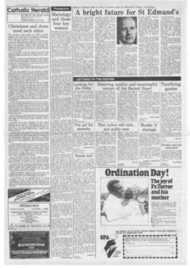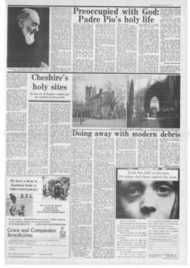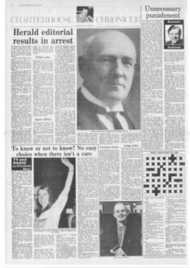Page 4, 10th July 1987
Page 4

Report an error
Noticed an error on this page?If you've noticed an error in this article please click here to report it.
Tags
Share
Related articles
Russian And Italian Themes At The Bath Festival
Notes And Comments
News Review
What Will Be The Position Of The Jew In The...
Not Really A Problem
Christians and Jews need each other
THE conviction of Klaus Barbie was virtually a foregone conclusion. Will it be the last trial of a major war criminal, even though it is known that many survived the chaos of immediate post-war Europe and escaped to various countries?
It is, one fondly hopes, in no spirit of revenge that such criminals are still being actively sought out and, where possible, and even at a great age, brought to justice. Perhaps the chief danger of the Holocaust's being less vivid to the minds of the younger generation is that the world is now so full of horror and murder that such things have less power to pulverise the mind into a state of shock.
It is even possible, on the other hand, that the recent and stepped-up attempts to remind the world about guilt for certain horrible acts against Jews in the past is turning out to be counterproductive
There have, moreover, been individual gestures which have led to unfortunate misunderstandings. The desire by the Carmelites to build a convent of reparation at Dachau was greatly resented by many Jews. The reason given was that such a convent would be standing on "desecrated ground."
A compromise was eventually reached whereby the convent was situated on "neutral" ground, with honour being saved on all sides.
There was some unseemly and quite unnecessary argument about whether Edith Stein was canonised recently because of her sufferings as Jew or as a Catholic. It is a pity that people did not realise that she was a saintly woman who had suffered both as a Jew and Christian; and it is an even greater pity that more stress is not laid nowadays on the common ground between Jews and Christians than on factors which still divide us.
It is unquestionably true that there are reasons for changing criteria of the protocol of the Holy See, but under present conditions the Pope could not unfortunately refuse the repeated requests of the Austrian government that their controversial President, Dr Kurt Waldheim, should be received by the Pope.
The Vatican newspaper Osservatore Romano on the day of the Waldheim visit published an article by Dom Pierfrancesco Fumagalli, secretary of the Commission for Relations with Judaism. It was headed "John Paul II and the Holocaust: the deep wound still bleeding of our century." It warned against "arousing suspicion of the take-over, dismissal or banalisation of the Holocaust."
Ordinary Christians and ordinary Jews do not hate each other. Far from it, though probably they do not meet often enough to get to know each other in order to act as the brothers and sisters which they are and feel themselves to be. It was only a small clique of officials who wished the death of Jesus. The gospels record frequently that the authorities could not proceed against Jesus because they were afraid of the ire of his countless Jewish brethren and friends.
Is there a clique now, in Jewish as well as Christian circles, that wishes to keep old prejudices alive? Let us hope that neither of such cliques will prove strong enough to influence ordinary decent opinion.
This makes all the more important last week's annual conference of the Council of Christians and Jews held at Hengrave Hall. Its theme was "Why Christians and Jews need each other." It is a very important theme and illustrates the positive rather than negative approach that is needed to this important question.
The latter aspect of this matter is illustrated by a recent remark made in Frankfurt by Irving Levine, representing the American Jewish Committee. He said he thought that the continuation of the Oberammergau Passion play represented a "Cancerous growth on the body of Christianity." But it subsequently became clear that he was not speaking on behalf of the majority of the Jews.
Another prominent American was in the news last week when discussing Catholic-Jewish relations. Fr John Pawlikowski, a professor at the Theological Union of Chicago, told an Oxford symposium that he was "deeply distressed and disturbed" by the Pope's reception of Dr Waldheim. However technically justified the visit was, it is clear, that in view of the tangled web of circumstances surrounding Waldheim, the visit was regrettable and, of course, offended Jews everywhere.
But the American Professor was also careful to strike a predominantly positive note. He is a leading Catholic theologian on the Holocaust and president of the American Holocaust Memorial Council. As such, his views carry considerable weight.
He believes that there have been substantial improvements in relations between Jews and Christians since Vatican II. Catholic education curricula and teaching materials now put a much greater emphasis on the positive influence of Jews and Judaism on Jesus and the early life of the Church.
Catholic theologians, moreover, have moved away from thinking about Jesus as a fulfilment of messianic prophecies. In addition, Jews had a better understanding of Christianity.
Fr Pawlikowski was also optimistic about the eventual recognition of Israel by the Holy See. But this can only be accomplished, in a general sense, by a greater realisation of how much Christians and Jews need each other and should get together more frequently to discover that they are indeed brothers and sisters.
blog comments powered by Disqus











